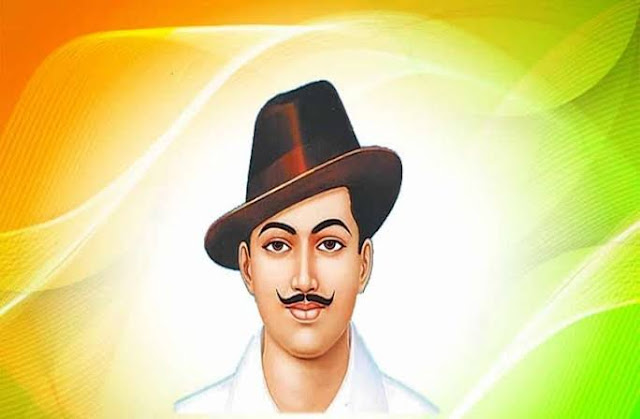The name Bhagat Singh is quite enough to make you blood hotter if you know any things about him. His bravery is impossible to explain in word. He was a responsible man and comitted for the freedom of India. For that he ran from his marriage. He lived his life totally for our country. His contribution was great for his Country.
Full name :- Bhagat Singh Sandhu
Date of Birth :- 28th September 1907
Father's name :- Sardar Kishan Singh
Sandhu
Mother's name :- Vidyavati
Birth place :- Lyallpur District Panjab
Died :- 23rd March 1931
Slogan :- " Inquilab Zindabad"
So, he born on 28th September 1907 in Lyallpur district Punjab (present in Pakistan). His Grandfather followed Swami Dayanda Saraswati who was the hindu reformist of Arya Samaj. His father and uncles were the member of Ghadar Party. Which was led by Karlar Singh Sorabha. For that the feeling of Nationalism came at very early stage of the life of Bhagat Singh. His famous Slogan "Inquilab Zindabad" full the people with lots of enthusiasm.
Incident from Bhagat Singh Childhood
Once upon a time when Bhagat Singh and his father were working in the field of Paddy. Then Bhagat Singh suddenly asked to his father that why couldn't we grow guns and bombs at the place these foodgrains by which we can fight with Britishers.
Like many Sikhs of his age Bhagat Singh didn't attend the khalsa High School (Lahore). Because Grandfather believe that the teacher of that Schools were loyat to Britishers. So he envolled Bhagat Singh in Dayananda Anglo Vedic. High School (Arya Samaj Institution). From where his idea of Nationalism turn him into a Socialist and atheist.
They may kill me but they cannot kill my ideas. They can crush my body but they will not be able to crush my spirit
- Bhagat Singh
Incidence made him a Socialist
We already know that the idea of Nationalism came at early age of his life because of his family and School life. But main two Incidence make him a pure Socialist with full of anger and enthusiasm.
1. Jallianwala Bugh massacre(1919) in which a huge amount of innocent people were killed in the open firing of Police. When he was only 12 year old.
2. Second incidence when a large no.of unarmed people killed at Gurudwara(1921) When he was only 15years.
Bhagat Singh Became a Revolutinary
When Non cooperation movement Bhagat Singh was following the Mahatma Gandhi. In which he refuse to use the British produced. But he stopped following Mahatma Ghandhi when Mahatma Ghandhi withdrew Non-cooperation movement due to Chauri Chaura Incident.
From that day Bhagat Singh understood the we can't get freedom from Non violence method of Mahatma Ghandhi. Those from there he adopted Revolutinary methods.
Then he joined Young Revolutinary movement to overthrow British violently. But he inspired by the Young Italy movement of Giuseppe Mazzin. And he found the Indian Socialist youth organisation named as Naujawan Bharat Sobha in the March 1926. Later he joined which Hindu Republican Association was led by chandrashekhar Azad. He was ran away from his marriage and Pater on he wrote "My life has been decided to the noblest cause that of the freedom of the Country, there is no. rest or desire that can lure me now." This show the commitment of Bhagat Singh for the freedom of his country.
1st Big Revolutinary activity of Bhagat Singh
There was a problem started when the Simon Commission came to India. Simon Commission was constitutional reforms in India for the Improvement of the country. But All India are not happy because there was no member of Simon Commission are Indian.
So, all Indian protested against the Simon Commission because if no Indian was the member of Simon commission there was no care of Indian. In this protest Lala Lajpat Rai death in lathi charge of police and Bhagat Singh couldn't do any thinks because he was hold on tightly by the British police. James Scott ordered police for lathi charge. But British Government said them Innocent.
So, Bhagat Singh took as personal loss. Therefore Bhagat Singh and colleagues decided to take revenge for this. Then Bhagat Singh, Shiravam Rajhuru, Sukhdev thapar, and chandrashekhar Azad killed Saunders. They were also sussecfull in escaping.
2nd Big Revolutinary Activity
The Second Big Revolutinary Activity had done when Bhagat Singh bomb on the Assembly the Public Safety act and Trade Disputed act were going to be passed. By which laber had no right to protest and police can sent any one behind the bar without trial. Where he allowed themselve to arrest to explain the Idea. For this he influence by Auguste Vaillant (a french anorchist).
So, Bhagat Singh got life sentence. But simultaneously the Saunders Murder case opened. Through which Police found the Lahore bomb factory and the Saharanpur factory. From where Hans Raj vohra and Jai Gopal were ready to give testimony against Bhagat Singh and his colleagues. For that Bhagat Singh sent to Mianwali Jail from Delhi Jail.
Protest in Mailwali Jail
In this Jail Bhagat Singh shaw that there was huge discrimination between the European & Indian prisoner in the work and food. So Bhagat Singh and his colleagues started Hunger strike. Police want to break the Hungry Strike brutally but not sussecfull.
Jatindra Nathdas lost life in 63days. Hunger Strike gain popularity thus government started trial of Saunders morder case. But Bhagat Singh stoped hunger strike due to the request of his father after 116 days. On 7th Oct 1930 Bhagat Singh, Sukhdev Rajguruproven as guilty. So court Sentenced them capital punishment by hanging them.
They had no opportunity to defend themselves. So, on 23rd March 1931 they got punishment by hanging, which was one day before schedule date due to public protest. Therefore 23rd March called as 'Martyrs day of Shaheed Diwas' and 'Sarvodaya Day'.












Bahut mast hai
ReplyDeleteWahh kya bat hai👍👍
ReplyDelete